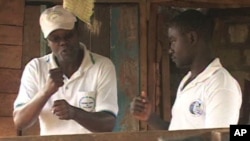In Kenya, educational and career opportunities are almost non-existent for people born with multiple physical challenges. They face many forms of discrimination - including lingering beliefs that their condition was caused by a curse. But one father whose son Brian was born deaf, mute and legally blind aims to change all that. Joseph Shiroko started a school four years ago that teaches students who cannot hear, speak, and who have very low or no vision, a wide array of skills to support themselves.
The baby clothes the students knit are well known in the local community. Students also produce energy-saving briquettes made from shredded recycled paper, sawdust and other ingredients. And the school has developed a reputation for its dried smoked meat products.
It's all in a day in the life at Brian Resource Center, a boarding school that teaches deaf and blind young Kenyans from across the country a variety of skills they can use to earn a living.
"We have a number of philosophies that inform what we are doing: accepting these people; loving them; giving them opportunities; trying to just think outside the box," said founder Joseph Shiroko. "Above all, what we are saying [is, we are] trying to do what I would call ordinary things, but in an extraordinary way."
Instructors, most of whom are graduates or are themselves physically challenged, work with students in such areas as animal husbandry, poultry rearing, tailoring, organic fertilizer production and re-forestation.
Mary Kerubo, 22, has a passion for knitting sweaters, which she plans to continue in her village.
"Because of the problems I face at home, I feel comfortable here because Sween [my teacher] understands me," said Kerubo. "Even if I do not see well, she always repeats her lessons again and again so that I may understand how to make sweaters. I know I will make it."
Kerubo's teacher, Sween Lyaka, was among the first graduates of Brian Resource Center four years ago. She says her students have a lot of unrecognized potential.
Sween says in the future, she plans to purchase four sewing machines that she will use to teach students and produce and sell sweaters in her home village.
Brian Resource Center offers a one-year residential program. Groups of four students live in family-style set-ups, contributing to household chores as they undergo their skills training.
The center also works extensively with students' families to set up projects that will continue after the students graduate.
That is what Alvin Ejakait and his father Victor plan to do.
"His concern mainly is livestock farming and in the beginning, he showed interest in livestock farming whereby he can [now] feed animals," said Victor, interpreting for his son. "We have tried actually to get some animals for him so that when he is at home, he must be able to take care of them."
It is difficult for many physically-challenged people to get educational and career opportunities in Kenya, especially those with more than one condition. Educational facilities and expertise are few,
and there is still a stigma associated with being physically challenged.
Founder Joseph Shiroko's son, Brian, was the inspiration behind Brian Resource Center. The senior Shiroko says he began the school initially as a project to teach Brian bakery skills.
The family later expanded Brian's training and brought in other young people with similar physical conditions. The elder Shiroko and his wife Mary are now training Brian to head up the center.




